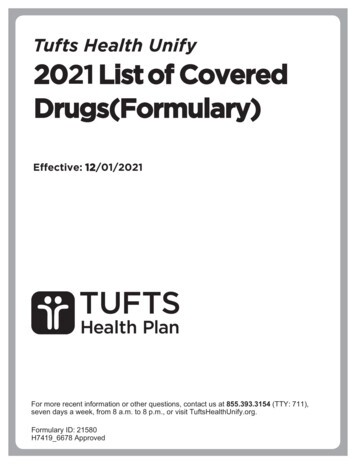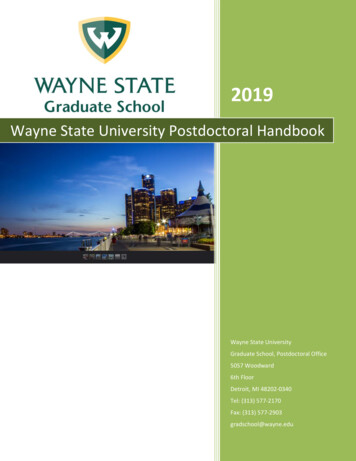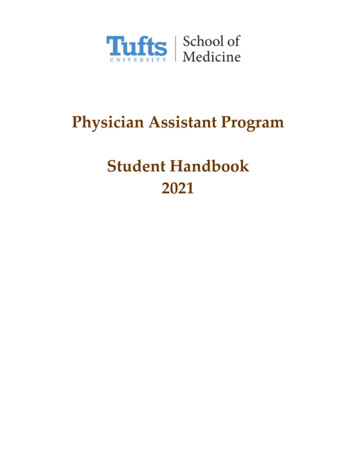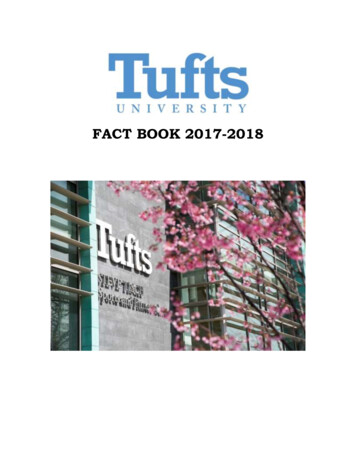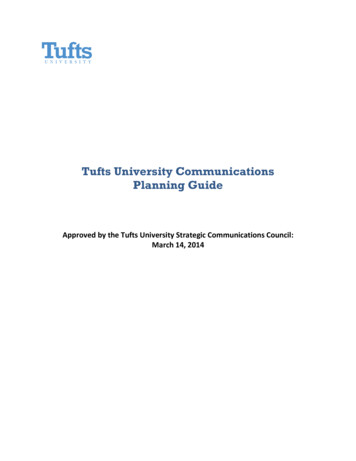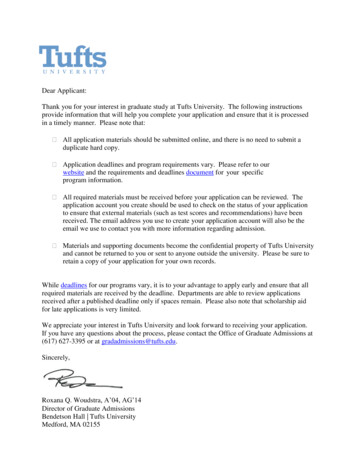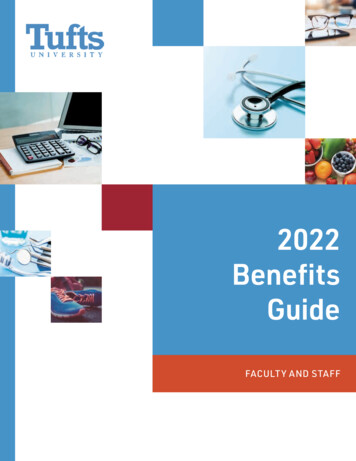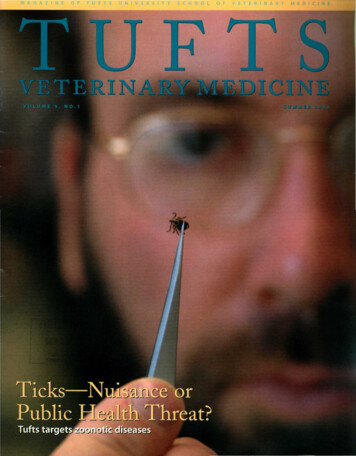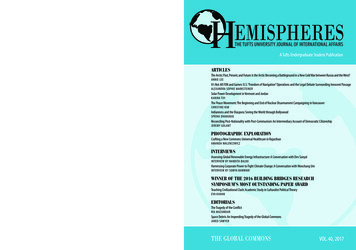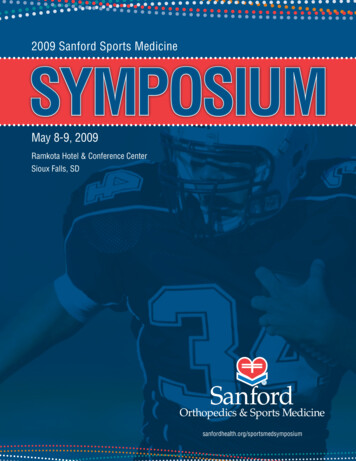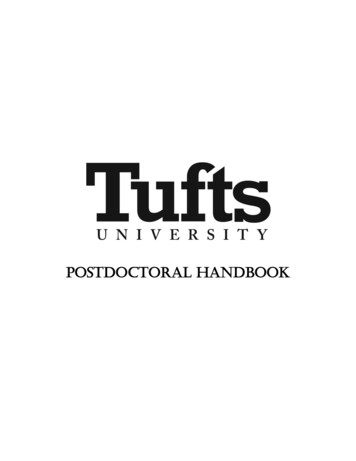
Transcription
POSTDOCTORAL HANDBOOK
Tufts University Postdoctoral HandbookTable of ContentsChapter One – Tufts University Postdoctoral Program1A. Mission of the Postdoctoral Program1B. Tufts University222Chapter Two – Postdoctoral Role, Appointment, Promotion andSeparation2A. The Role of a Postdoctoral Scholar2B. Confirmation of Employment2C. Conditions of Employment Activation2D. Postdoctoral Scholar Orientation2E. Length of Employment2F. Separation4Chapter Three – Compensation and Benefits3A. Payday3B. Compensation Levels3C. Merit Increases3D. Postdoctoral Scholar Review3E. Tax Liabilities of US Citizens and Permanent Residents3F. Tax Liabilities of Nonresident Aliens3G. Benefits88888899Chapter Four – Postdoctoral Responsibilities4A. Conform to Established Policies and Procedures4B. Ownership of Research data, Notebooks and Reagents4C. Communicate Research Results to Advisor4D. Publish Research Results4E. Participate in Activities of the Research Group and Department4F. Responsible Conduct of Research111111111212121456777Revised 02/2014
Tufts University Postdoctoral HandbookChapter One – Tufts University Postdoctoral Program1 A. Mission of the Postdoctoral ProgramThe mission of the Postdoctoral program at Tufts University is to provide an environment inwhich Postdoctoral Scholars can broaden their research abilities and equip themselves with theskills necessary for a successful career in their chosen field. Postdoctoral Scholars at Tufts areobligated to carry out a research program to the best of their ability under the guidance of aresearch advisor.Tufts University’s web site at: http://www.tufts.edu/ contains general information about theuniversity’s schools, programs, policies and activities. Information about policies that apply topostdocs can be found in:The Postdoctoral Handbook available at: ides policies and guidance which apply exclusively to Postdoctoral Scholars. Thereis also a postdoc website at: http://www.tufts.edu/central/research/postdoc/ withadditional information.Many of the policies in the Employee Handbook, which may be accessed at,http://hr.tufts.edu/wp-content/uploads/Emp EmployeeHandbook.pdf also apply toPostdoctoral Scholars.Postdoctoral Scholars may also be subject to additional policies that are specific for their hostResearch Advisors, Departments and Schools.The policies and guidance in this handbook may be changed at any time and this handbook doesnot create a contract between the University and any Postdoctoral Scholar.1 B. Tufts UniversityFounded in 1852, Tufts University (Tufts) is recognized among the premier universities in theUnited States. Tufts enjoys a global reputation for academic excellence and for the preparation ofstudents as leaders in a wide range of professions. Recognized by the Carnegie Foundation as a"Doctoral/Research Extensive" institution based on the breadth of basic and clinical researchconducted, Tufts has extensive and highly regarded liberal arts, sciences and engineeringprograms that draw outstanding students with the highest academic achievement and standingfrom around the world.Postdoctoral Scholars at the University may work on one of three campuses. The Medford Somerville campus houses all undergraduate and some graduate programs, including the Schoolof Arts and Sciences, the Graduate School of Arts and Sciences, the School of Engineering, theFletcher School, and the Jonathan M. Tisch College of Citizenship and Public Service.The Boston Health Sciences campus houses the School of Medicine, the School of DentalMedicine, the Sackler School of Graduate Biomedical Sciences, the Gerald J. and DorothyR.Friedman School of Nutrition Science and Policy, and the Jean Mayer USDA Human NutritionResearch Center on Aging at Tufts. The Cummings School of Veterinary Medicine is located onthe Grafton campus, 40 miles west of Boston.Each School within the University has a Postdoctoral Officer overseeing affiliated PostdoctoralScholars. Tufts is a vibrant academic community that is enriched by the presence of these2Revised 02/2014
Tufts University Postdoctoral Handbookindividuals. Postdoctoral scholars are vital to our research and educational community andcontribute greatly to the success of Tufts. The administration is strongly committed to enrichingScholars' preparation as researchers within the university setting as well as in their future careerpaths.3Revised 02/2014
Tufts University Postdoctoral HandbookChapter Two - Postdoctoral Role, Appointment, Promotion and Separation2 A. The Role of a Postdoctoral ScholarGeneral Overview:Postdoctoral Scholars carry out a research program under the guidance of a research advisor, whois generally a Tufts faculty member. Postdoctoral Scholars meet regularly with their advisors toapprise the advisor of the research results, discuss progress in the research, develop andtroubleshoot approaches, plan upcoming work, receive direction and focus to the research, and toexpress mutual expectations.The program aims to equip Postdoctoral Scholars with the skills necessary to becomeindependent researchers in their respective areas of specialization. The research trainingexperience at Tufts typically lasts up to five years, or until completion of six years of postdoctoral research in total. The Program is intended as a training program of finite duration, asopposed to a permanent position, that will enable Postdoctoral Scholars to become independentresearchers.Position Requirements:Postdoctoral Scholars are persons who have earned a Ph.D., M.D., D.V.M., D.D.S., D.M.D.,Ed.D. or equivalent doctoral-level degree and may have worked previously as a full-timeresearcher in a postdoctoral training position. Postdoctoral Scholars are engaged in research,scholarship, and training. This includes, but is not limited to, design and execution of scholarlyresearch that may include laboratory experiments, attendance at national and internationalmeetings, participation in undergraduate or graduate courses, including seminars and researchworkshops, and mentoring graduate students and/or undergraduates. In some cases, limitedopportunities to participate in teaching may be available. Other opportunities include workshopsrelated to career development. Advisors supervise all of these activities.Since the Postdoctoral Scholar’s experience is transitional to becoming an independentresearcher, the Postdoctoral Scholar is expected to make his or her best effort to acquire thevarious skills necessary to advance his or her career in today’s job market with guidance from theadvisor. These skills include, but are not limited to:The ability to present research plans and findings in a cogent fashion, both in oral and writtenmodes of communication. These skills may be developed by writing grant applications,reviewing manuscripts submitted for publication, writing research papers and reviewingarticles, and regular presentation of the Postdoctoral Scholar’s research at meetings andconferences held at Tufts and elsewhere.The ability to carry out mentored research with the primary objective of developing thePostdoctoral Scholar’s research skills in preparation for a career. Enhancing intuitiveability and promoting independent thinking is a goal of Tufts’ Program which may resultin a Postdoctoral Scholar obtaining new research insights.The ability to establish contacts and network with colleagues pursuing related researchagendas. Such contacts can lead to much fruitful collaboration and can often yield promisingemployment opportunities.A goal of the Postdoctoral Scholar’s research is the dissemination of knowledge to theprofessional community. It is expected that research will be of publishable quality, and will4Revised 02/2014
Tufts University Postdoctoral Handbookbe published in a journal appropriate to the field in a timely manner. A Postdoctoral Scholaris responsible for writing his or her manuscripts, with guidance from his or her Advisor. ThePostdoctoral Scholar is expected to participate in writing grant applications and reports thatpertain to his or her research.As part of the research training experience, Postdoctoral Scholars are expected to participatein all formal and informal academic endeavors of the Advisor’s research group andDepartment. These activities include, but are not limited to: group meetings; joint meetingswith other groups having similar research orientation; journal clubs for in-depth discussion ofrecent primary research literature; and regular research seminars. These activities lead to anunderstanding of research group management and supervision of others.If the Postdoctoral Scholar’s career aspirations include research and teaching in an academicsetting, the individual may be given opportunities to present lectures in one or more classes.Postdoctoral Scholars learn current research methods through direct experience working with anadvisor with the same primary interest. The Postdoctoral Scholar’s advisor is the frontline sourceof information and the one who sets the standards of conduct for efficient, ethical and productiveresearch. Communication between a Postdoctoral Scholar and his or her advisor is of utmostimportance and is regarded as both an opportunity and a responsibility.At the completion of their training, Postdoctoral Scholars will have learned appropriate researchtechniques, been exposed to current research problems, and they will be familiar with thestrengths and weaknesses of research methods and developed the necessary portfolio of researchaccomplishments as assessed by publications, presentations and evaluative letters to becompetitive for an independent position.Individual Development PlansTo assist postdoctoral scholars with their career development, Tufts provides two IndividualDevelopment Plan (IDP) documents. One of these, the Postdoctoral Scholar IDP, is intended tobe a tool that can help scholars consider their career aspirations and the types of skills andattributes that may affect their career objectives. This document is for each scholar's personal useonly. If a scholar chooses, the document may be shared with mentors or may be used to helphim/her think about ways to engage mentors and improve skills that are appropriate to the careerpath(s) that are being considered.The second document, called the Training and Career Goals Progress Report, is designed to helpscholars think about how they are developing professionally. This report should be completedannually and shared with the research advisor prior to the annual review performance discussion.2 B. Confirmation of EmploymentPostdoctoral Scholars will receive a letter confirming employment.There are no unpaid Postdoctoral Scholars at Tufts nor does Tufts allow postdocs to volunteer todo research.5Revised 02/2014
Tufts University Postdoctoral Handbook2 C. Conditions of Employment ActivationEmployment will be effective only after the following conditions have been met by thePostdoctoral candidate:1. Completion of an application for employment.2. Proof of completion of the Doctoral Degree - The candidate must show an official diploma ortranscript (with translation into English if it is in a foreign language), or other acceptable proof offinal doctoral degree conferral to the hiring department’s administrator/manager. A copy will besent to the Human Resource department for inclusion in the employee’s record. If the final degreehas not yet been formally conferred, but all the requirements have been met, a statement ofcompletion of studies from the prospective Postdoctoral Scholar’s home institution (Registrar'sOffice or Dean of Graduate Studies) is requested for conditional admission for twelve months.This statement should indicate the date on which all requirements were completed and theexpected degree conferral date. If the degree is not formally conferred within twelve months, thePostdoctoral Scholar will be required to withdraw from his/her Tufts Postdoctoral position.3. Proof of employment eligibility - The candidate must prove that he/she is eligible to work inthe United States by completing an I-9 Employment Eligibility Verification and providingappropriate documentation.4. Visa requirement for Non-United States Citizens - A candidate who is not a United Statescitizen must provide evidence of work eligibility at Tufts University that is valid for the entireperiod of employment. The University's International Affairs Offices, located on the Boston andMedford campuses, can provide information regarding H1, J1, and other non-immigrant visas.The sponsoring faculty member or Department will provide assistance in completing theappropriate visa application. However, the University generally will not apply for permanentresidence on the candidate's behalf. The University will pay certain fees associated with visaapplications. The employer is required to pay an anti-fraud fee and many, but not all, departmentspay the H1-B visa filing fee. However, other fees in connection with the visa and its revalidationare the Postdoctoral Scholar’s responsibility. Government regulations stipulate that J-1 visaholders enroll in insurance coverage which is provided through the university. The University'sInternational Office can provide information regarding this coverage. For more up to dateinformation on visas or to ask questions, please visit the University’s International Affairs website: http://www.tufts.edu/med/about/offices/iao/ in Boston or http://ase.tufts.edu/icenter/ inMedford.5. Social Security Number - A United States Social Security Number (SSN) must be reported forall new hires. If the candidate does not have a SSN, he/she must apply for one at a local office ofthe Social Security Administration. Any employee who will be paid on the University payrollmust have a Social Security Number or show proof that he/she has completed an application forthat number.6. Completion of Tax Withholding Information - An Employee’s Withholding Allowanceinformation indicates the number of federal (W-4) and state (M-4) withholding allowancesclaimed. This can be changed at any time in Employee Self Service. Taxation for non-residents isgoverned by specific regulations. These employees may also be eligible for tax treaties. Pleasesee section 3E below.6Revised 02/2014
Tufts University Postdoctoral Handbook7. Completion of Direct Deposit Authorization - Direct deposit allows the net pay to be depositedto a bank of choice, provided that the bank is a member of the Automated Clearing House.Payment through direct deposit is a condition of employment at the University.8. Completion of the Tufts University Employee Background Summary /Self-IdentificationInformation - This information is requested to meet Federal government reporting requirements.2 D. Postdoctoral Scholar OrientationHuman Resources Orientation - Postdoctoral Scholars are invited to participate in an orientationgiven by Human Resources, which includes an overview of Tufts and discussions topics such asemployment policies, technology resources, Environmental Health and Safety, Tufts Police,identification cards, and parking facilities.Postdoctoral Orientation - Postdoctoral orientations are held quarterly during the academic year toencourage Scholars to learn about policies that are specific to them, meet their colleagues and tolearn about the postdoctoral program at Tufts.Additional Orientations - Postdoctoral Scholars must comply with specific requirementsincluding health evaluation, immunization or training that may be required for PostdoctoralScholars who work with laboratory animals, are involved in human subject research, or areinvolved in work that could expose them to biohazards.2 E. Length of EmploymentEmployment at Tufts as a Postdoctoral Scholars should not exceed five years or until completionof six years of Postdoctoral research in total. A term may be extended due to unusualcircumstances. Each School's Postdoctoral Officer will have additional information on this issueand is the only person authorized to allow extensions. The Postdoctoral Officer may alsoauthorize part-time employment in unusual circumstances.2 F. Separation1. Termination for performance reasons - A Postdoctoral Scholar may be terminated ifperformance is unsatisfactory. Usually, there will be a written communication discussingperformance concerns and suggestions for achieving a satisfactory level of performance.However, the University reserves the right to terminate a Postdoctoral Scholar without suchwritten review.2. Resignation - If a Postdoctoral Scholar decides to resign, he/she should inform the advisor andthe School's Postdoctoral Officer in writing and provide one month’s notice.3. Compliance with University Policies upon Separation - Under all circumstances, upon leavingemployment, a Postdoctoral Scholar has an obligation to leave the research records and materialsin a state that will allow continuation of the project and ensures compliance with all applicablepolicies.7Revised 02/2014
Tufts University Postdoctoral HandbookChapter Three - Compensation and Benefits3 A. PaydayPostdoctoral Scholars are paid semimonthly. Payday is the 15th and 30th of each month or theprevious workday if the 15th or 30th falls on a weekend or holiday. At the end of each payperiod, participants can review deposit information indicating gross pay, taxes, deductions, andnet pay in Employee Self Service. Some Postdoctoral Scholars may be paid directly from theirgranting agency, or they may be paid by both Tufts and an external organization. PostdoctoralScholars who do not receive pay from Tufts will be considered employees for health insuranceand other postdoctoral policies including intellectual property rights. Postdoctoral Scholars mustwork half time or greater to be eligible for benefits.3 B. Compensation LevelsThe Advisor, in accord with University guidelines, will determine compensation levels forPostdoctoral Scholars. The minimum amount will be tied to the amount supported by the NationalInstitutes of Health (NIH)-National Research Service Award (NRSA) for Postdoctorals with zeroyears of experience. Information is available at: http://grants.nih.gov/training/nrsa.htm. Scrolldown to NRSA Stipend Levels on this website and select the most recent year. Compensation willbe adjusted if a Postdoctoral Scholar is employed less than full-time.Compensation levels for Postdoctoral Scholars who are funded by an organization external toTufts will be determined by the awarding body, but will not be less than the minimum, in U.S.dollars, for Postdoctoral Scholars with 0 years of experience.3 C. Merit IncreasesThe advisor will determine pay increases for Postdoctoral Scholars each year, following theUniversity guidelines and schedule for merit increases and within any grant constraints. Meritincreases are usually effective July 1 of each year. The awarding body will generally determinemerit increases for Postdoctoral Scholars who are funded by an external organization.3D. Postdoctoral Scholar ReviewAdvisors/faculty mentors and their Postdoctoral Scholars should meet regularly to reviewresearch findings, discuss and plan future work and to assess progress. In addition to these regularmeetings, each Scholar and advisor are required to meet annually to review research progress,performance, and career goals. A Postdoctoral Scholar Review Form is available on the HRForms page http://hr.tufts.edu/forms/ under Performance Development Program resources toguide this discussion. The signed signature page of the review form must be returned to eachSchool’s postdoctoral office. If a Postdoctoral Scholar’s job performance is unsatisfactory, thismay be cause for termination of the appointment.3 E. Tax Liabilities of U.S. Citizens and Permanent ResidentsPostdoctoral Scholars who are paid by the University are subject to federal and state taxes. Eachemployee has the opportunity to indicate the number of federal and state withholding allowanceswhen they complete a W4 at the time of hire or at a later date. Postdoctoral Scholars who are paidthrough individual or Institutional Federal Training Grants may be exempt from FICA (Social8Revised 02/2014
Tufts University Postdoctoral HandbookSecurity) taxes. The taxability of these fellowships will be reviewed at the initiation of eachaward.3 F. Tax Liabilities of Nonresident AliensA number of variables, such as country of origin, tax treaty terms (if any), or visa type areconsidered in determining the tax liability of nonresident aliens. Non-resident alien employeesshould contact the HR Service Center at 617.627.5811 and ask to speak with someoneregarding this particular issue to obtain additional information or to discuss their specifictaxation situations.3 G. BenefitsThe benefits described in this handbook apply to Postdoctoral Scholars who work half time (17.5hours per week) or greater. Employees who work less than half time are not eligible for benefitprograms. Health Insurance - Postdoctoral Scholars are required to enroll for individual coverage in theUniversity's postdoctoral health insurance plan, administered by Harvard Pilgrim Health Care, ahealth maintenance organization that provides both routine medical and major medical insurancecoverage. The cost of this health plan is provided at no cost to qualified Postdoctoral Scholars.The insurance plan will be waived for those Postdoctoral Scholars who can show evidence ofadequate coverage by other plans. Coverage for spouses, qualified same-sex domestic partners,and dependent family members is paid for in full by the Postdoctoral Scholar through payrolldeduction. Dental Insurance- Postdoctoral Scholars are eligible to participate in the Delta DentalPPO Plus Premier Plan. This plan includes in and out-of-network coverage for preventivecare and for other basic and major restorative services. These Scholars pay reasonablerates for this coverage which is administered for the University by Crosby BenefitSystems. Postdoctoral Scholars are also eligible to receive limited dental health servicesthrough the Tufts University Undergraduate Dental School Clinic. Services are providedat no charge and include radiographs, oral examinations, prophylaxis, and emergencyservices. The Health Administration Fee for these services is provided as a no costbenefit to the Postdoctoral Scholar. All other treatment procedures through theUndergraduate and Graduate Dental School Clinics will be provided at the full fee,although those enrolled in the dental plan receive discounts on services Tufts University Health Care and Dependent Care Flexible Spending Accounts (FSA):Postdoctoral Scholars holding an appointment of twelve months or longer may contribute to anFSA. Postdoctoral Scholars must sign up during the Open Enrollment period each year, for thefollowing calendar year. Flexible Spending Accounts allow you to set aside a portion of your payon a pre-tax basis to pay for eligible medical, dental, vision, child care and elder care expenses.For additional information see the Human Resources website. Tufts University 403(b) Retirement Plan – Postdoctoral Scholars holding an appointment oftwelve months or longer AND who pay FICA tax are allowed to contribute to the TuftsUniversity 403(b) Voluntary Retirement Plan. Eligible Postdoctoral Scholars may sign up for the403(b) Voluntary Retirement Plan at any time throughout the year. Enrollment is availablethrough Employee Self Service. When you log in and make your election or change your9Revised 02/2014
Tufts University Postdoctoral Handbookcontribution, the election takes effect the first paycheck of the following month. You may elect tocontribute an annual amount up to the current federal deferral limit. Tuition Benefits – Postdoctoral Scholars are not eligible for Tufts Tuition Remission orReimbursement programs. Sick Time - Nonexempt benefits apply. (See Employee Handbook http://hr.tufts.edu/wp-content/uploads/Emp EmployeeHandbook.pdf Extended Sick Pay - Nonexempt benefits apply. (See Employee Handbook link above) Leaves - Nonexempt benefits apply. (See Employee Handbook link above) Unpaid Personal Leave of Absence -Under exceptional circumstances, a Postdoctoral Scholarmay need to take an unpaid leave of absence. Such leave may be granted at the discretion of theAdvisor, in consultation with the School's Postdoctoral Officer and Human Resources, whether ornot the Postdoctoral Scholar has vacation or sick leave to his/her credit. For further information,see the Employee Handbook. Vacation - Postdoctoral Scholars are entitled to three weeks of paid vacation (15 days/105hours each year) pro-rated for part-time and part-year schedules.Vacation time is awarded on July 1, the beginning of the fiscal year.Unused vacation may not be carried from year to year, nor will it be paid out uponseparation from the University.If a Postdoctoral Scholar is hired after July 1, the vacation award will be prorated toreflect a partial year. A Postdoctoral Scholar who begins employment on the first of amonth will receive their vacation award that month. A Postdoctoral Scholar hired afterthe first will receive their award at the beginning of the next month.If a Postdoctoral Scholar is transferred or promoted to another position in the university,s/he will forfeit their postdoctoral vacation award and follow the vacation policyapplicable to their new status.Scheduling vacation: All vacation schedules must be approved by your supervisor. Wheneverpossible, vacation time should be requested at least three (3) weeks in advance. Progress inyour research and the scheduling of experiments (for laboratory-based scholars) may beconsidered when setting vacation schedules. Personal Days - Full-time employees receive two personal days (14 hours) per fiscal year (July1 –June 30). Part-time and part-year employees receive pro-rated personal days based on theirregular work schedule. These days must be used each year; they do not accrue. (See EmployeeHandbook: http://hr.tufts.edu/wp-content/uploads/Emp EmployeeHandbook.pdf.10Revised 02/2014
Tufts University Postdoctoral HandbookChapter Four - Postdoctoral Responsibilities4 A. Conform to Established Policies and ProceduresPostdoctoral Scholars are required to comply with all established policies and procedures of theresearch group, Department, and University. These include, but are not limited to: The conscientious discharge of research responsibilities; Conformity with ethical standards in research; Participation in Responsible Conduct of Research training as required; Maintenance of adequate research records; Compliance with University standards and regulations governing laboratory practices includingbut not limited to the use of isotopes, chemicals, infectious agents, animals, biosafety, andhuman subject research if the Scholar is engaged in these activities; Open and timely discussion with his/her advisor regarding possession or distribution ofpublications, materials, reagents, or records relevant to the research project, and any proposeddisclosure of findings or techniques privately or in publications; Collegial conduct towards co-workers and members of the research group; Compliance with all applicable University policies; Assurance that any work performed outside of the University does not conflict with theUniversity’s Business Conduct Policy or Intellectual Property Policy, and the Advisor isinformed of such activities.Postdoctoral Scholars should become familiar with the research policies that are posted on theOffice of the Vice Provost website at: http://viceprovost.tufts.edu/.4 B. Ownership of Research Data, Notebooks, and Reagents (applicable to postdoctoralscholars who are using university facilities in the conduct of their research)It is the policy of Tufts University that all notebooks, research data, and reagents generated inTufts University research groups are the property of the University. These materials must remainwith the research advisor at the termination of the postdoctoral position.Intellectual property rights are governed by the Tufts University Policy on Rights andResponsibilities with regard to Intellectual Property, which can be found athttp://viceprovost.tufts.edu/?pid 6&c 6.4 C. Communicate Research Results to AdvisorThe Advisor is normally the frontline source of information and the one who typically setsstandards for the conduct of efficient, ethical and productive research. Therefore, communicationbetween a Postdoctoral Scholar and his/her Advisor is of utmost importance and should beregarded as both an opportunity and a responsibility. A Postdoctoral Scholar should meetregularly with his/her Advisor according to a mutually convenient schedule. These meetingsshould be used to apprise the Advisor of the research results, for the development andtroubleshooting of approaches, to provide direction and focus to the research, to air concerns andconflicts, and to express mutual expectations.11Revised 02/2014
Tufts University Postdoctoral Handbook4 D. Publish Research ResultsOne goal of Postdoctoral research is the dissemination of knowledge to the professionalcommunity. It is expected that the Postdoctoral Scholar’s research will be of publishable quality,and be published in a journal or book appropriate to the field in a timely manner. A PostdoctoralScholar is responsible for writing his/her manuscripts, with guidance from the Advisor. TheScholar should participate in writing grant applications and reports that pertain to the research. Ifa Postdoctoral Scholar working in a laboratory based research group fails to write up his/herresults in a timely fashion, the Advisor may choose to do so, since publications are critical forcontinued funding.4 E. Participate in the Activities of the Research Group and DepartmentAs part of the training experience, Postdoctoral Scholars are expected to participate in all formaland informal academic endeavors of
researcher in a postdoctoral training position. Postdoctoral Scholars are engaged in research, scholarship, and training. This includes, but is not limited to, design and execution of scholarly research that may include laboratory experiments, attendance at national and international
